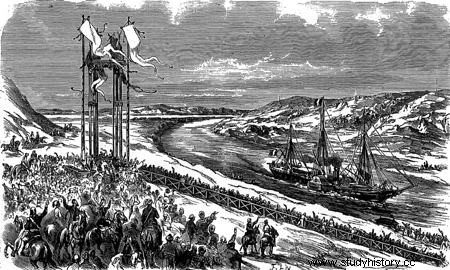
1869 — Lesseps won the game. The canal is practically complete; only a few million cubic meters remain to be cleared, an insignificant quantity compared to what has already been removed. A commission of scholars and practitioners was set up to examine the conditions for the operation of the canal, and Lesseps wrote to it:We are only waiting for the expression of your opinion to inform the universal navy of the conditions under which the maritime canal de Suez will definitely be handed over to navigation.
This sentence had about as much impact in the world as the first blow of the pickax ordered by Lesseps had had ten years earlier. It was like the signal for a great reversal of opinion among all those who had never ceased to doubt the possibility of the work, then to thwart, fight and undermine its realization, and who, today, hastened to push themselves to the forefront of the thuriferous.
On March 14, the waters of the Mediterranean were brought to the Bitter Lakes. Ismail Pasha himself attended. Where there was only arid sand and desolation now throbbed with life. A new province was almost miraculously added to his kingdom. His name deserved to be cited after those of Nikos, Darius and Trajan.
The sovereign spent three whole days visiting all the shipyards by boat, from Port Said to the town that bears his name. A flotilla escorted it, laden with state dignitaries. An immense crowd of Europeans and natives had come from all directions to acclaim the khedive, and everywhere there were enthusiastic receptions and cheers.
